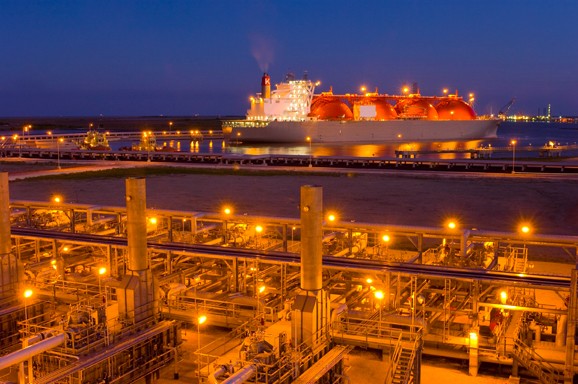Sabine Pass LNG terminal, image: Bechtel
March 4 (Bloomberg) — Russia’s military intervention in Ukraine bolsters the case for easing restrictions on exports of the U.S.’s booming natural gas production, according to energy analysts and industry groups.
Russia, the world’s second-largest producer of natural gas after the U.S., has twice since 2006 cut supplies of the fuel to Ukraine, a conduit for energy to Europe. Greater access to U.S. supplies would blunt the ability of Russia to use energy as a weapon, according to supporters of lifting export curbs.
“This is a geopolitical fulcrum that we could be utilizing if we didn’t have this protectionist constraint on U.S. energy,” Christopher Guith, vice president for policy at the U.S. Chamber of Commerce’s Institute for 21st Century Energy, said in a phone interview.
Russia is canceling the price discount on natural gas for Ukraine because of its debt owed to Russian gas giant OAO Gazprom, President Vladimir Putin said today during a news conference. At the same time, the U.S. is preparing a financial- assistance package for Ukraine that would include $1 billion in loan guarantees to help the nation offset reduced energy subsidies, according to a White House statement today.
U.S. producers see the crisis as another reason to speed approval of pending LNG-export permits.
U.S. Reviews
American companies need the U.S. Energy Department’s permission to export liquefied natural gas to countries that lack a free-trade agreement with the U.S., such as those in the European Union. LNG-export projects also need to pass a Federal Energy Regulatory Commission environmental and safety review.
The Energy Department is weighing approval of at least 24 applications from companies including Cheniere Energy Inc. and Kinder Morgan Inc. to export the liquefied version of the fuel in tankers, after approving six applications since 2010.
While Ukraine has been in a state of political unrest for months, the situation became particularly tense over the weekend after Russian President Vladimir Putin sent troops to occupy Crimea, a peninsula in eastern Ukraine where pro-Russian sentiment is high.
“American natural gas can ease the vulnerability of the region to supply constraints,” Dan Whitten, a spokesman for America’s Natural Gas Alliance, a Washington-based industry group, said in an e-mail. “We hope and believe that some of our abundant natural gas can make its way to our friends in Europe to reduce this vulnerability.”
EU Talks
President Barack Obama’s administration is brokering a trade deal with the 28-nation European Union, though the talks are still in relatively early stages, and negotiators don’t expect a deal until at least the end of the year. The U.S. doesn’t have free-trade deals with Ukraine or Russia.
On Capitol Hill, Russia’s intervention in Ukraine has already begun to shape the energy and trade debate.
“The Department of Energy’s approval process for LNG exports is unnecessarily putting our allies at the mercy of Vladimir Putin,” House Energy and Commerce Committee Chairman Fred Upton, a Michigan Republican, said in a statement. “Now is the time to send the signal to our global allies that U.S. natural gas will be an available and viable alternative to their energy needs.”
Negotiations Halted
Senate Finance Committee Chairman Ron Wyden, an Oregon Democrat, plans to ask Treasury Secretary Jacob J. Lew at a panel hearing tomorrow how U.S. trade and investment can be used to respond to Russia’s actions in Ukraine, Keith Chu, a committee spokesman, said in an e-mail.
The Obama administration has halted bilateral trade and investment talks with Russia, Trevor Kincaid, a spokesman for the U.S. Trade Representative’s Office, said last night in an e- mail. As recently as December, Russian officials met with U.S. Trade Representative Michael Froman to discuss the possibility of boosting trade between the two nations through by increasing investment and standardizing regulations.
Even if the Energy Department were to approve the remaining LNG-export applications immediately, the fuel wouldn’t be ready for market. Proposed terminals, which cost billions of dollars to build, must also pass the Federal Energy Regulatory Commission’s environmental and safety review.
The commission has approved just one of the LNG-export projects reviewed by the Energy Department since 2010. That facility, Cheniere’s Sabine Pass terminal in Cameron Parish, Louisiana, won’t be operational until at least late 2015.
‘Good Thing’
“The U.S. needs to get its LNG exports in place sooner rather than later,” Zach Allen, president of Pan Eurasian Enterprises Inc., a Raleigh, North Carolina-based tracker of LNG cargoes, said in a phone interview. “Any supply source of LNG to increase the resilience of European markets to short-term swings would be a good thing.”
Russia’s Gazprom says it now provides about 30 percent of the natural gas that powers electricity generators, furnaces and factories across the region, and Europe buys about a third of the 4.2 million barrels of crude OAO Rosneft pumps daily.
If Russian gas supplies to Ukraine are disrupted, European buyers would be forced to compete with Asian customers for LNG on the global spot market, Allen said.
Japan, which imported record amounts of LNG after the 2011 Fukushima nuclear disaster, paid an average of $16.49 per million British thermal units for LNG shipments from Qatar, the world’s biggest exporter of the fuel, in December, government data show. The U.K. paid $10.48 per million Btu for cargoes from Qatar over the same period, data from London-based shipbroker Poten & Partners Inc. show.
Falling Sales
“It’s really a question of whether Putin wants to shoot Gazprom in the foot,” Anders Aslund, a senior fellow at the Peter G. Peterson Institute for International Economics in Washington, said in a phone interview. He said Russia’s sales to Europe have already declined by 30 percent since 2009, after the nation restricted natural gas supplies to Ukraine. In the meantime, Europe has increased its imports of the fuel and increased storage, Aslund said.
Russian gas supplies to Ukraine were disrupted temporarily in 2006 and 2009 because of pricing and debt disputes, cutting off deliveries to southeastern Europe. Prices of some LNG cargoes to Europe jumped above $30 per million British thermal units as a result of the disruption in 2009, Allen said. Besides physical supply disruptions, the unrest in Ukraine could pose financial complications for the gas trade if the U.S. and its allies impose economic sanctions on Russia, Allen said.
Diversifying Sources
The European Union has been diversifying its energy portfolio to rely less on Russian natural gas for more than a decade, Kevin Book, managing director of ClearView Energy Partners LLC, a Washington-based energy consultancy, said in an e-mail.
At the same time, U.S. natural gas production has surged due to advances in drilling techniques, including hydraulic fracturing or fracking. Europe has already benefited from diverted LNG cargoes that would have gone to the U.S. and coal exports from the U.S., Book said.
While there aren’t any short-term opportunities to reduce the existing European reliance on Russian natural gas, medium- term options include imports from the U.S. and other suppliers, he said.
“European interest in U.S. gas exports is likely to grow, but economic considerations are likely to predominate,” Book said. “U.S. companies don’t export out of the kindness of their hearts, and European customers don’t buy with indifference to price.”
– Brian Wingfield and Christine Buurma, Copyright 2014 Bloomberg.

 Join The Club
Join The Club











